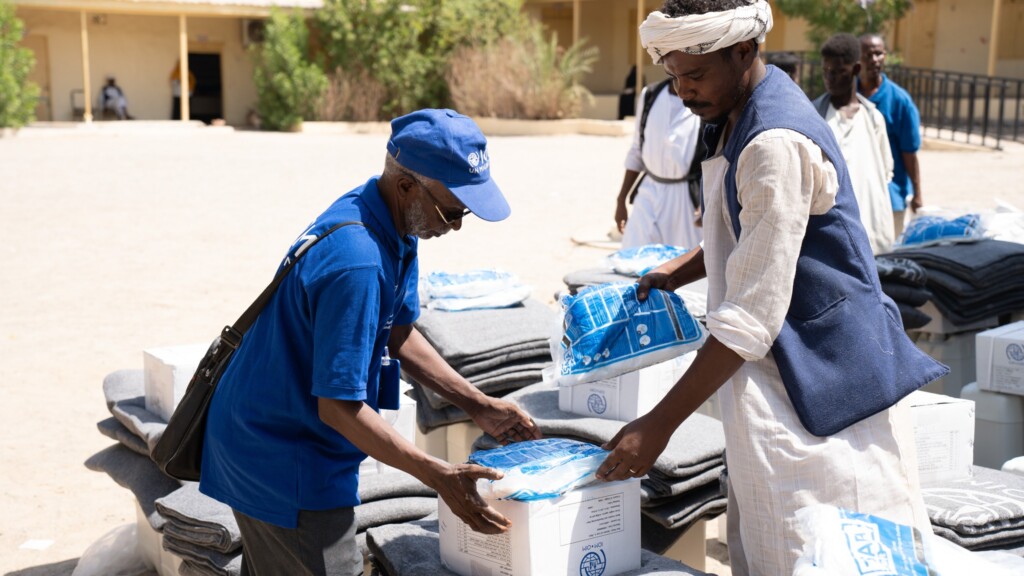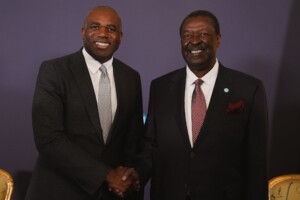Sudan talks kick-off in Jeddah

The Jeddah negotiations are focused on aspects including facilitating the delivery of humanitarian aid. Here, IOM distributes non-food aid in Port Sudan (Photo: Satti Mohammed / IOM)
The Jeddah negotiation platform, facilitated by Saudi Arabia and the USA, in partnership with the African Union and the Intergovernmental Authority for Development (IGAD) in the Horn of Africa, officially announced the start of talks between the Sudan Armed Forces (SAF) and the Rapid Support Forces (RSF) in the Saudi capital yesterday.
In a statement issued by the Saudi Foreign Affairs Ministry yesterday, the facilitators said negotiations are focused on a truce, facilitating the delivery of humanitarian aid, and confidence-building measures, as well as the possibility of a permanent cessation of hostilities.
The facilitators from the USA, Saudi Arabia, and the Intergovernmental Authority for Development (IGAD) stressed that the talks would not address issues of a political nature. The facilitators were assigned the sole joint spokesperson for the talks, with the agreement of the SAF and the RSF.
The facilitators noted that the talks were guided by the rules of conduct agreed by the parties.
The statement stressed that the SAF delegation is headed by Admiral Mahjoub Bushra and Major Abubakar Abufagiri and the membership of Moataz Fadul and Colonel Talal Suleiman.
While the RSF delegation is headed by Brig Omar Hamdan and Faris El Nour, with Mohamed El Mukhtar and El Gouni Hamdan Dagalo, brother of RSF Commander ‘Hemedti’, as members.
Omar Siddig and Salah El Mubarak will attend as experts alongside the armed forces, while Ezzeldin El Safi, and Nizar Sayed attend as experts for the RSF.
The Arabic Asharq TV channel reported that the opening session was held in the presence of the two parties after mediation was able to address differences between the two parties. The differences relate to the refusal of the RSF to let Ambassador Omar Siddig participate in the opening session.
RSF
The RSF yesterday welcomed the joint statement of the facilitators team on the start of talks on the Sudanese crisis.
In a statement, the RSF affirmed that it believes in negotiated solutions “to reach a comprehensive solution that addresses the roots of the Sudanese crisis, and lead to building the Sudanese state on new foundations”. The militia also pointed to the importance of “rebuilding a single professional national army that protects the homeland and the people (and) distances itself from politics”.
US State Dept
The US Department of State stressed the need for civilians in Sudan to determine the country’s course and play the leading role in determining the process of addressing political issues and restoring democratic transition.
Department Spokesperson Matthew Miller said in a press statement yesterday that there is no acceptable military solution to the conflict. He called on the armed forces and the RSF to handle the talks constructively and create a path to a negotiated solution. The United States continues to call on all external actors to avoid fuelling the conflict.
He thanked Saudi Arabia for hosting the Jeddah talks between the army and the RSF and welcomed IGAD which, on behalf of the African Union, is also participating as co-facilitator.
Miller said the talks included a limited set of objectives to facilitate the delivery of humanitarian aid, establish ceasefires and other confidence-building measures, and build toward a lasting ceasefire. of hostilities, stressing that it will not address broader political issues.
“It is time to stop the senseless violence, resume civilian rule, and allow the people of Sudan to realize their demands for freedom, peace and justice,” Miller said.
UNITAMS
UN Integrated Transition Assistance Mission in Sudan (UNITAMS) welcomed the resumption of talks in Jeddah.
In a statement yesterday, UNITAMS expressed hope that this new round of negotiations will lead to the implementation of the Declaration of Commitment to Protect Civilians in Sudan, signed on 11 May, and a comprehensive ceasefire, both of which are necessary to alleviate the suffering of the Sudanese people.
UNITAMS also welcomed “also welcomed the current initiatives by a broad range of civilian actors calling for an end to the war, underscoring the pressing need for a solution that would lead to a resumption of the democratic political transition”.
The UN mission said it will continue to work with international and regional actors — including the African Union and IGAD — to support ongoing mediation efforts for a peaceful resolution of the conflict in Sudan.











 and then
and then